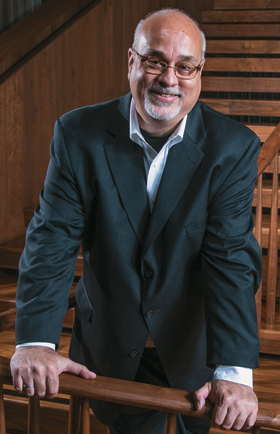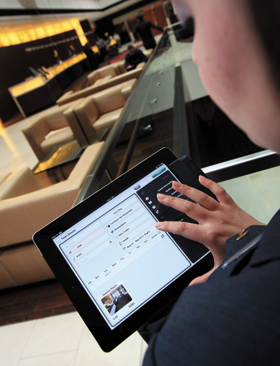Using iPads at Check-In Provides Customer Service Boost for Hyatt Hotels
Customer service is a critical part of the Hyatt hotel chain’s business. Happy customers express their satisfaction in ways that appear on the company’s bottom line.
When Hyatt learned that equipping its associates with tablet devices to use while interacting with customers significantly improved customer service, the company decided to aggressively expand its tablet rollout at facilities across the globe.
The devices have become an important element in how the company serves customers, enhances overall customer experience and makes its hotel staff more effi cient. By the end of 2013, tablets and other mobile devices will be mainstays for Hyatt Hotels.
The jumping-off point for this initiative was Hyatt Regency O’Hare, the company’s high-profile, 1,100-room facility near Chicago’s hyperactive O’Hare International Airport. Guests can now check in while they’re waiting for the hotel shuttle bus at the airport or as they enter the hotel’s main lobby, where they’re greeted by associates toting Apple iPad devices.
The tablets include custom software that connects to the hotel’s back-end property management system and custom hardware for swiping credit cards and issuing room keys.
The benefiits of a tablet-based service for checking guests in and out became clear shortly after Hyatt Regency O’Hare began testing the solution last winter.
Positive ratings in guest satisfaction surveys shot up 20 percent for those who interacted with Hyatt associates with iPad devices.
These upbeat first impressions often have a lasting impact, Hyatt executives say. “When you have a great check-in experience, you’ll likely look at your guest room and the entire ambience from a rosier perspective,” says John Prusnick, director of IT innovation and strategy for Hyatt Hotels & Resorts. “There definitely are ripple effects.”
Successful feedback may have come quickly, but getting to that stage took time and careful planning, he says. Also important was the expertise of CDW, which took the lead in configuring hundreds of mobile devices. These preparations and the lessons Hyatt learned along the way offer important insights for organizations in other markets about how to turn tablets into valuable business tools.
Taking Steps to Modernize Hospitality
Hotels such as Hyatt are learning that tablets can serve a larger goal — namely enhancing customer experience as a competitive diff erentiator by achieving better service, efficiency and problem resolution.
“If a guest needs to know what ballroom a business meeting is in, and an agent with a tablet has that information at the fl ip of a finger, you are providing heightened customer service in a powerful way,” says Greg Buzek, president of IHL Group, an analysis firm that specializes in the hospitality and retail industries. “It immediately says that you are a premium hotel.”
Today, the staff at Hyatt Regency O’Hare maintains about 10 iPad devices that rotate into service for six associates who typically work in the lobby or meet guests at the airport.
Hyatt began its tablet program with the launch of its innovative Andaz brand. At the Andaz hotels, the tablets were used to create a more personalized and modern check in experience.
“We knew we’d found a solution that had a positive impact to our guest experience and improved the working environment for our associates,” says Brian Erdman, an analyst for IT operations at Hyatt Hotels & Resorts.
But could Hyatt successfully translate tablets to a larger facility like Hyatt Regency O’Hare? Within a few weeks of launching a pilot study, the company had its answer.

Photo: Todd Winters
“When you have a great check-in experience, you’ll likely look at your guest room and the entire ambience from a rosier perspective,” says John Prusnick, Director of IT Innovation and Strategy for Hyatt Hotels & Resorts.
“The feedback in our interviews with guests at that facility was overwhelmingly positive,” Erdman says. “A few guests said this approach made them feel like a VIP.”
Formal research showed other benefits. For example, Hyatt boosted its Net Promoter scores, industry measurements that gauge a customer’s enthusiasm for a company and the likelihood that he or she would recommend it to others.
“If 1 percent of our loyalty program people stay one extra day or their recommendations result in additional bookings, that translates into a significant revenue increase for the company,” says Prusnick.
Tablets Contribute to a Whole New Experience
The underlying reasons for these reactions are clear. The tablet-inspired innovations fundamentally change a customer’s experience at Hyatt facilities.
“Associates come out from behind the front desk to socialize and interact with customers, and that makes the arrival feel less like a transaction and much more like a welcoming experience,” Prusnick explains. “Having our staff completely untethered so they can facilitate check-ins at the airport has also been very impactful for our guests. It has created a level of customer intimacy that none of our competitors offer.”
Guests arriving as part of a large group also benefit from the tablets. Hyatt can add tablet-toting associates as needed to shorten queues and keep the check-in process flowing smoothly.
At the end of the stay, guests can also choose to interact with an iPad-equipped agent when checking out. In addition to augmenting customer service, the approach saves on supplies.
“We would rather e-mail a copy of the receipt to guests as they leave as opposed to printing it,” says Prusnick. “We are fi nding that people who use a mobile host are comfortable with the checkout process and with having a copy of their guest record e-mailed to them.”
Hyatt understands that not all guests have the same needs. So it continues to offer a range of choices for arrivals and departures, including the traditional frontdesk experience and unmanned kiosks in the lobby.
“Every check-in is unique, and we’ll continue to address this by letting guests choose the option that is most comfortable for them personally,” Prusnick says.
Supporting the Support Staff
Behind the scenes, the tablets off er additional advantages for Hyatt. Because both the hardware and the software are easy to use, associates need a minimum of training.
On-screen graphics show essential customer information at a glance, such as whether a guest is a new or returning client.
“With the iPad, the procedures are smoother and require fewer keystrokes than with the traditional desktop application,” Erdman says. “With the tablet, the information is all on one screen. And to confi rm that information is accurate, the agent just turns the tablet around to show the guest.”
Prusnick says tablets also bring more variety to an associate’s day, because they now can divide their time between working at the front desk, moving about the lobby and meeting travelers at the airport. “Tablets give them new fl uidity, and that makes their day much more interesting and exciting,” he says.
Many support staff members are also using wireless devices for increased effi ciency. For example, a new application that Hyatt implemented from M-TECH called HotSOS helps housekeeping and engineering workers address individual requests for room amenities, such as special pillows or extra blankets.
The program runs on the Apple iPod touch, a smartphone-sized digital device. The housekeeping staff can use the tools to quickly change the availability status of a room once it’s been cleaned and log maintenance requests, such as the need for a new light bulb or a plumbing repair.
Why the iPad Stands Out
Hyatt chose iPad devices over other tablets because each new iPad version also has maintained compatibility with earlier versions of Apple’s iOS operating system.
Prusnick says that Hyatt’s software developer finds the iOS platform easy for programming. Using iPad devices also ensures that the proprietary applications written for the tablets will run on the iPod touch and iPhone form factors.
“That gives us the functionality we need to check in and check out a guest on different platforms,” says Prusnick.

Photo: Paul S. Howell
“A few guests said this [tablet] approach made them feel like a VIP,” says Brian Erdman, Analyst for IT operations at Hyatt Hotels & Resorts.
But Hyatt quickly realized it needed help rolling out the hardware and software. Each of the hundreds of devices used in Hyatt properties across the U.S., Canada and the Caribbean must be set up with the company’s proprietary applications and configurations. So the hotel chain turned to CDW and the resources of its Configuration Centers, state-of-the-art facilities that are ISO 9001:2000-certified and that can build and install preconfigured solutions for enterprises.
“Configuring the devices was creating a burden for the various Hyatt locations,” says Russell Pavlak, CDW account manager. “But we have teams in place that specialize in configuring hundreds of systems at a time. That made it possible for us to immediately offer a turnkey solution for Hyatt.”
Configuration team members install Hyatt’s custom applications onto each device and send the hardware to the appropriate Hyatt location.
“We created a wireless profile for them, as well,” Pavlak adds. “The various hotel locations sent our configuration team the permissions needed to get on the hotels’ wireless networks securely, and CDW added the profiles to the iOS devices. Each location has a different profile, which makes the networks more secure.”
Another challenge that Hyatt faced was developing the right tools for the room-key system. The Hyatt chain is moving away from magnetic stripe keys, used at many hotels, in favor of more reliable RFID key systems. The card encoders used on the iPad devices had to support this newer technology.
Hyatt is also working with its peripherals developer to build encoders that will eventually support Near Field Communications, an emerging wireless technology that’s starting to show up in some mobile devices. In fact, Near Field Communications may in the future allow smartphones to replace room keys and to be used as electronic wallets.
“We are hopeful that in the future you will have a quick and easy check-in experience just by taking your iPhone to a kiosk or going up to an agent who has an iPad,” Prusnick says.
Network connectivity also was an important consideration. Hyatt runs the tablets on an 802.11n wireless infrastructure, relying on the Simple Certificate Enrollment Protocol for user authentications and to regulate mobile devices as they pass through a firewall to the back-end server.
The server for retrieving room records and room-key encoding runs on a dedicated segment of the larger network in order to further secure communications with the property management system.
A Foundation for the Future
Hyatt Regency O’Hare is one of the largest of nearly a dozen Hyatt hotels that are taking advantage of tablets for both check-in and check-out services. But those numbers will be growing quickly over the next few months.
“We’re continuing to deploy the solution to other facilities to make this part of our brand standard,” Prusnick explains. “Virtually all of our hotels will have both check-in and check-out capabilities by the end of next year.”
After that, Prusnick will be ready for the next wave of innovations brought on by expanding mobile solutions.
“We have embraced mobility in a way that will allow us to be very nimble about addressing the changes in how consumers are using mobile technology while they’re traveling,” he says.









